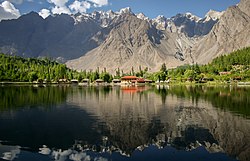Skardo
| Skardu سکردو སྐརདུ |
|
|---|---|
| City | |

Shangrila Resort, the image the contest in 2015
|
|
| Location in the Karakoram region | |
| Coordinates: 35°17′25″N 75°38′40″E / 35.29028°N 75.64444°ECoordinates: 35°17′25″N 75°38′40″E / 35.29028°N 75.64444°E | |
| Country |
|
| Autonomous territory |
|
| District | Skardu |
| Elevation | 2,228 m (7,310 ft) |
| Population | |
| • | 500–600 |
| Time zone | PST |
| • Summer (DST) | GMT+5:00 (UTC) |
| Website | http://www.skardu.pk/ |
Skardu (Urdu: سکردو, Balti: སྐརདུ་་) is a town in Gilgit-Baltistan region of Pakistan, and serves as the capital of Skardu District. Skardu is located in the 10 kilometres (6 miles) wide by 40 kilometres (25 miles) long Skardu Valley, at the confluence of the Indus and Shigar Rivers at an altitude of nearly 2,500 metres (8,202 feet). The town is considered a gateway to the eight-thousanders of the nearby Karakoram Mountain range. The town is located on the Indus river, which separates the Karakoram Range from the Himalayas.
The name "Skardu" is believed to be derived from the Tibetan word for "stony meteorite" Tibetan: སྐར་རྡོ་, THL: skar rdo.
The first mention of Skardu dates to the first half of the 16th century. Mirza Haidar (1499–1551) described Askardu in the 16th-century text Tarikh-i-Rashidi Baltistan as one of the districts of this country. With the conquest of in 1586 by the Mughal Emperor Akbar (1556–1605), started by Ali Sher Khan Anchan, the kings of Skardu were mentioned as rulers of Little Tibet in the historiography of the Mughal Empire. These are, in particular, histories of Al-Badaoni, Abu'l Fazl, 'Abdu-l Hamid Lahori, Saqi Must'ad Khan and Inayat Khan.
...
Wikipedia


